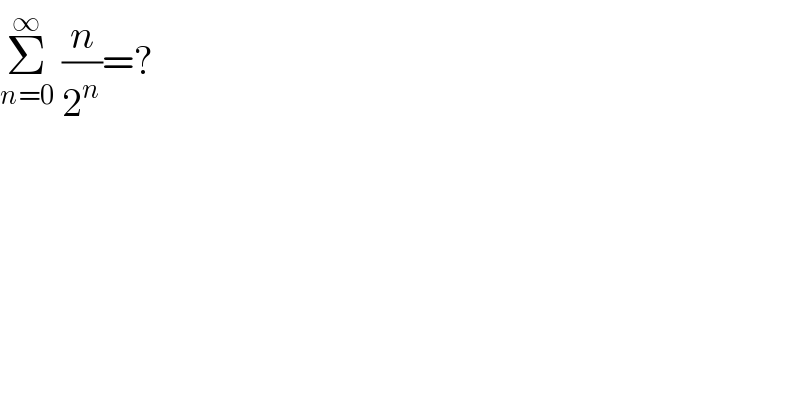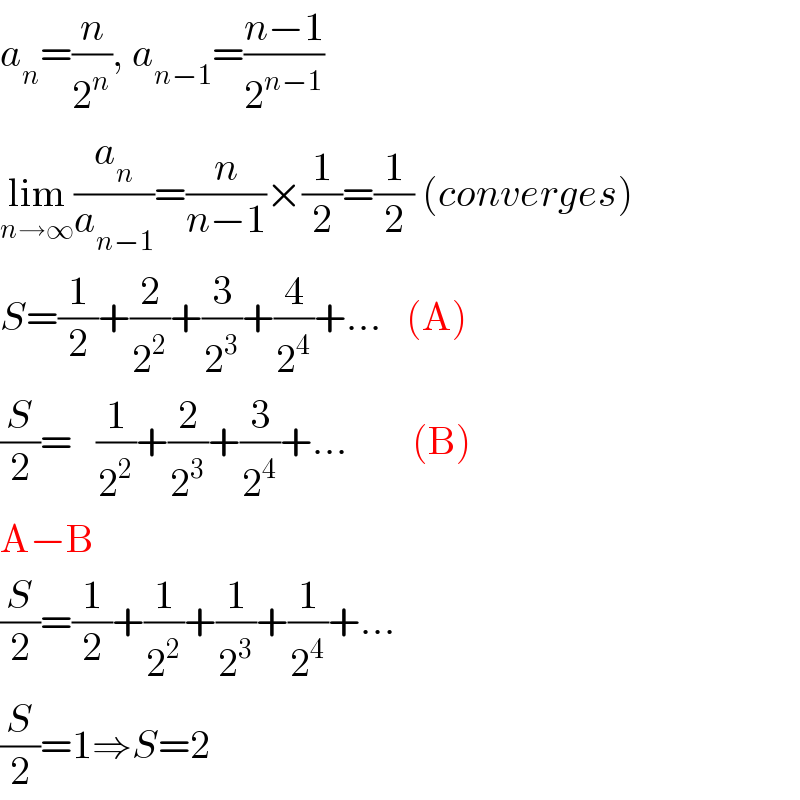
Question Number 3734 by prakash jain last updated on 19/Dec/15

$$\underset{{n}=\mathrm{0}} {\overset{\infty} {\sum}}\:\frac{{n}}{\mathrm{2}^{{n}} }=? \\ $$
Answered by prakash jain last updated on 19/Dec/15

$${a}_{{n}} =\frac{{n}}{\mathrm{2}^{{n}} },\:{a}_{{n}−\mathrm{1}} =\frac{{n}−\mathrm{1}}{\mathrm{2}^{{n}−\mathrm{1}} } \\ $$$$\underset{{n}\rightarrow\infty} {\mathrm{lim}}\frac{{a}_{{n}} }{{a}_{{n}−\mathrm{1}} }=\frac{{n}}{{n}−\mathrm{1}}×\frac{\mathrm{1}}{\mathrm{2}}=\frac{\mathrm{1}}{\mathrm{2}}\:\left({converges}\right) \\ $$$${S}=\frac{\mathrm{1}}{\mathrm{2}}+\frac{\mathrm{2}}{\mathrm{2}^{\mathrm{2}} }+\frac{\mathrm{3}}{\mathrm{2}^{\mathrm{3}} }+\frac{\mathrm{4}}{\mathrm{2}^{\mathrm{4}} }+...\:\:\:\left(\mathrm{A}\right) \\ $$$$\frac{{S}}{\mathrm{2}}=\:\:\:\frac{\mathrm{1}}{\mathrm{2}^{\mathrm{2}} }+\frac{\mathrm{2}}{\mathrm{2}^{\mathrm{3}} }+\frac{\mathrm{3}}{\mathrm{2}^{\mathrm{4}} }+...\:\:\:\:\:\:\:\:\left(\mathrm{B}\right) \\ $$$$\mathrm{A}−\mathrm{B} \\ $$$$\frac{{S}}{\mathrm{2}}=\frac{\mathrm{1}}{\mathrm{2}}+\frac{\mathrm{1}}{\mathrm{2}^{\mathrm{2}} }+\frac{\mathrm{1}}{\mathrm{2}^{\mathrm{3}} }+\frac{\mathrm{1}}{\mathrm{2}^{\mathrm{4}} }+... \\ $$$$\frac{{S}}{\mathrm{2}}=\mathrm{1}\Rightarrow{S}=\mathrm{2} \\ $$
Commented by Rasheed Soomro last updated on 19/Dec/15

$$\boldsymbol{\mathcal{T}{han}\mathcal{K}}^{\mathcal{S}} ! \\ $$
Commented by Rasheed Soomro last updated on 19/Dec/15

$$\begin{cases}{\frac{{S}}{\mathrm{2}}=\:\:\:\frac{\mathrm{1}}{\mathrm{2}^{\mathrm{2}} }+\frac{\mathrm{2}}{\mathrm{2}^{\mathrm{3}} }+\frac{\mathrm{3}}{\mathrm{2}^{\mathrm{4}} }+...}\\{\frac{{S}}{\mathrm{2}}=\frac{\mathrm{1}}{\mathrm{2}}+\frac{\mathrm{1}}{\mathrm{2}^{\mathrm{2}} }+\frac{\mathrm{1}}{\mathrm{2}^{\mathrm{3}} }+\frac{\mathrm{1}}{\mathrm{2}^{\mathrm{4}} }+...}\end{cases}\mathcal{H}{ow}\:{is}\:{derived}? \\ $$
Commented by prakash jain last updated on 19/Dec/15

$$\mathrm{Added}\:\mathrm{clarification}. \\ $$$$\mathrm{Actually}\:\mathrm{I}\:\mathrm{was}\:\mathrm{working}\:\mathrm{on}\:\mathrm{Q3716}\:\mathrm{and}\:\mathrm{was} \\ $$$$\mathrm{trying}\:\mathrm{some}\:\mathrm{series}\:\mathrm{for}\:\mathrm{comparision}\:\mathrm{so} \\ $$$$\mathrm{posted}\:\mathrm{those}. \\ $$
